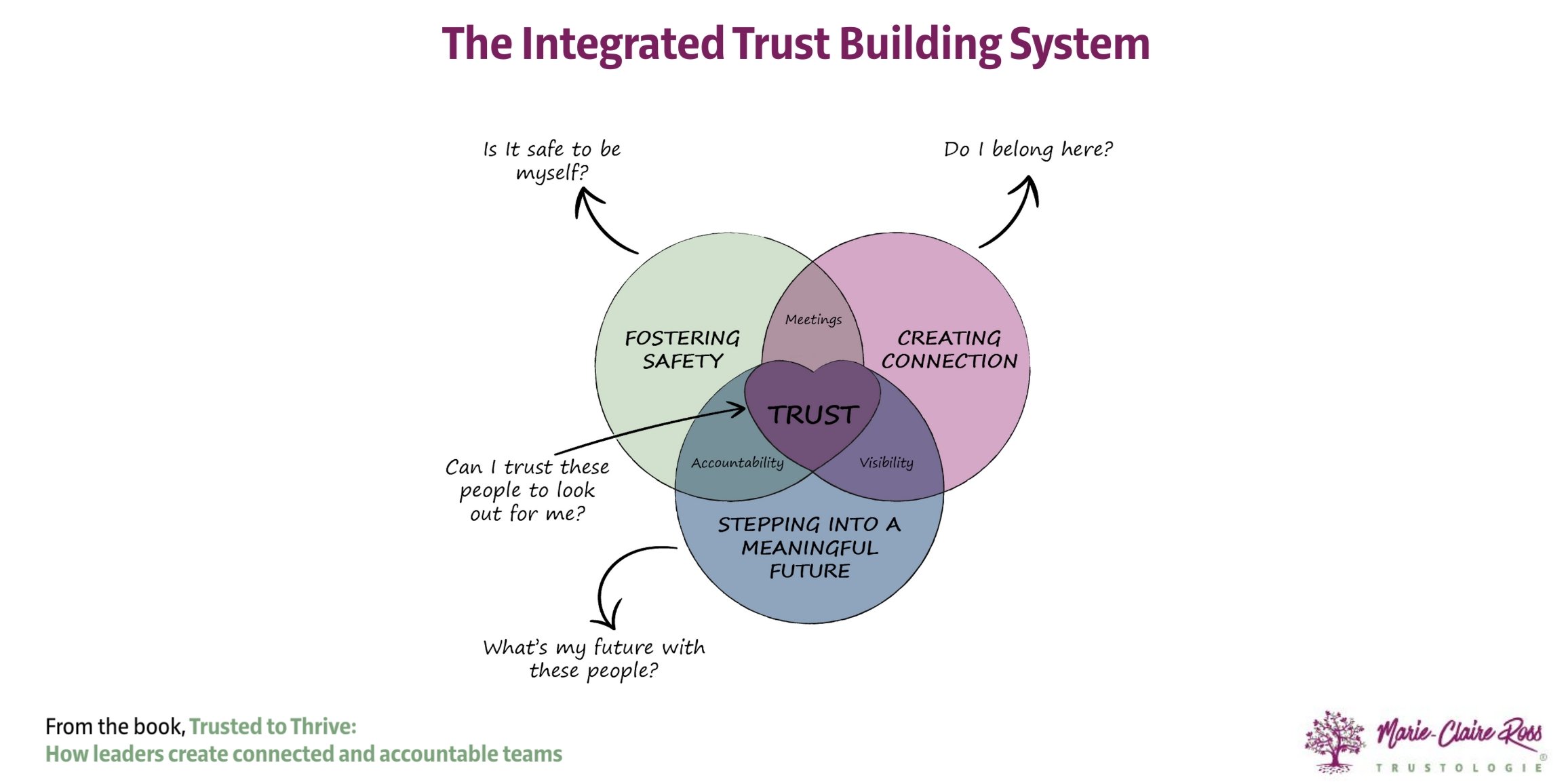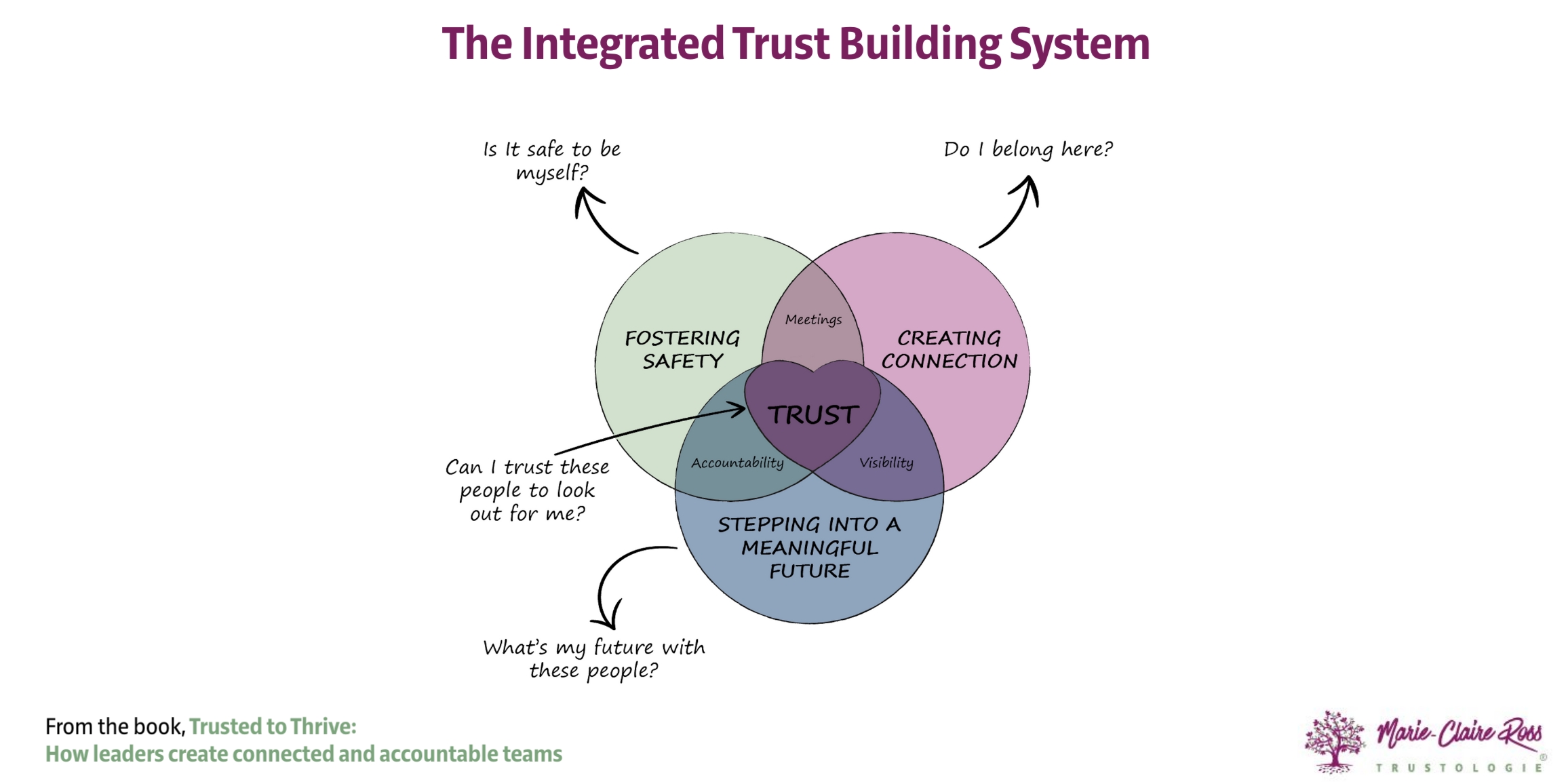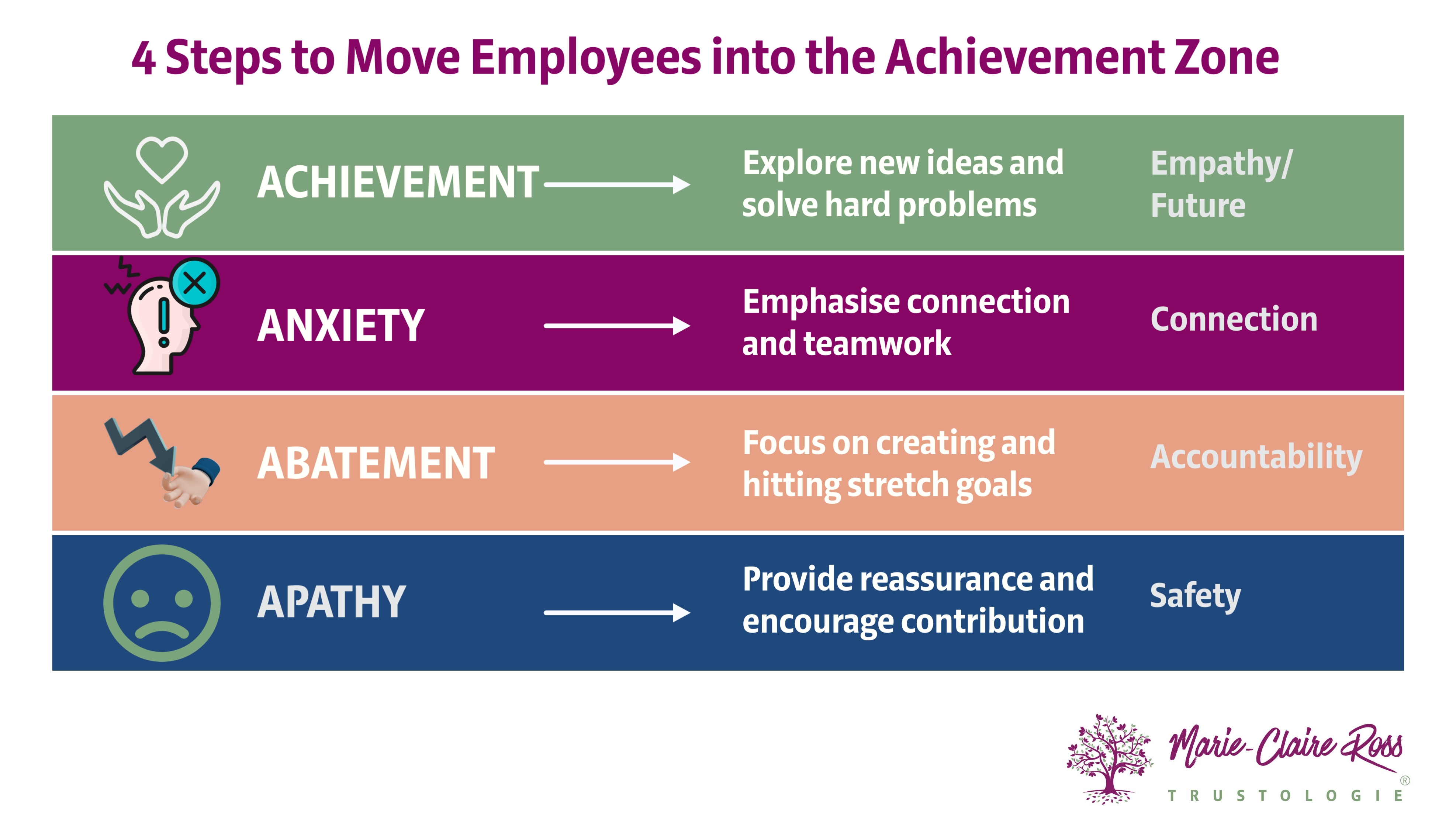11 min read
4 Practical Strategies for Better Emotional Management in the Workplace
I have a friend who often finds herself at the mercy of her emotions. Recently, she called me to rehash a confrontation she’d had with a group of...
Develop leaders, strengthen executive teams and gain deep insights with assessments designed to accelerate trust and performance.

Transform how your leaders think and perform with keynotes that spark connection, trust and high-performance cultures.

Explore practical tools, thought-leadership and resources to help you build trusted, high-performing teams.

Trustologie® is a leadership development consultancy founded by Marie-Claire Ross, specialising in helping executives and managers build high-trust, high-performing teams.

7 min read
Marie-Claire Ross : Updated on March 19, 2023

One of the big issues that has percolated to the top of most leader's wish lists is how to keep good people. They worry about what they need to do to encourage their high performers to stay and at the same time, improve the performance of low performers.
It seems like a lot to work on. Yet, the reality is that there is only one thing you need to focus on to improve performance and that is to help employees love their job.
As Mikhail Csikszentmihalyi said in his ground-breaking book, Flow, about fifty years ago, the reality is that when workers really enjoy their work they not only benefit personally, but they’re also more efficient. That's because they go into flow.
In positive psychology, a flow state, also known colloquially as being in the zone, is the mental state in which a person performing some activity is fully immersed in a feeling of energised focus, full involvement, and enjoyment in the process of the activity.
As Marcus Buckingham contends in his latest book, Love + Work, we must redesign jobs around a simple powerful concept: love for the content of the work itself. We assume people won’t love a job, but that’s not taking on board peoples specific likes and preferences. As leaders, we need to stop designing or even thinking that people won't love their job. This requires ensuring that we lead our teams to make it easier for them to be in flow.
So let's take a look at eight things that help employees love their work:
According to a 2022 Deloitte Digital Study, employees that trust their boss are 260% more motivated to work, have 41% lower rates of absenteeism and 50% less likely to look for another job.
What the pandemic has highlighted is the importance of employees feeling trusted by their boss. We all want to feel that we are trusted to be working when we can't be seen.
Usually leaders will tell me that they want to build trust so that their team will do work right, other teams will collaborate better with their team, and executives will trust what they are doing.
While this is all important, what few realise is that trust is reciprocal. It requires honest self-awareness to assess whether you are perceived as a trusted leader.
Are you turning up to work on time? Are you owning and fixing up mistakes to the best of your ability? Do you truly understand what the other person wants so you can deliver to their expectations? When we don’t take the time to understand each other’s expectations, the relationship becomes unbalanced resulting in each side questioning the other’s intent.
As a leader you model the right behaviours for your employees to follow. Often, when they are not doing what we like (eg: getting work done well), it is often a reflection on areas we need to improve. Leaders who are open, humble and willing to practise self-awareness are more likely to be trusted.
The Integrated Trust Building System (from the book, Trusted to Thrive, get a free chapter here) helps you unpack what you need to focus on to help employees love their work. It is unpacked in the next four ways to help employees love their job.

One of the benefits of psychological safety is that it creates an environment where people are willing to learn. We are more likely to adapt to change in a culture where learning from mistakes is rewarded and indeed, celebrated.
As a leader, you want to take your direct reports on a journey where you are all learning together. Learning is safe and protective. You want to learn forward. Not only does that increase safety, but it also improves people’s confidence and competencies. It's how you transition your team into high performance.
Learning forward as a team enables employees to expand their abilities. It creates a wonderful virtuous cycle where employees learn, try something new and receive positive results. Boosting motivation and confidence to continue.
It reverses the negative impact of a vicious cycle where people feel uncertain and fearful, fail to get results and their confidence drops; so they refuse to learn or try anything new.
We are biologically wired to want to be with other people. Having a sense of connection to those around us improves our well-being.
Neuroscience experiments show that when people intentionally build social ties at work, their performance improves. Those that have high trust levels at work have more meaningful relationships and feel both secure in and loyal to their group. They also know they have support when they need it.
Furthermore, we trust people who are similar to ourselves. You can unite people together, no matter how different they are, by aligning them to the company purpose or a really compelling goal.
Give teams time to socialise and talk about things that are non-task related. Sponsor lunches, activities and after-work parties.
When people have clear direction, understand the meaning of their role and how it contributes to the success of the organisation, they feel as though their contribution matters. Their work inspires them to get out of bed each morning excited to go to work.
Essentially, people love their job, if it matters if they show up to work because their work makes a difference. When employees understand their overall role in the business 91% will work towards that success, but the number plummets to 23% if they don’t (Bill Quirke, Melcrum).
Work with each of your employees to challenge them to higher levels of performance through helping them set stretch goals combined with regular feedback on progress.
Ensure that you align an individual’s self-interest to the greater impact of the organisation. Take the time to align people's personal goals to their work goals. Find out what your people are passionate about and work towards helping them find meaningful tasks in the company that matches their passions.
To improve this, clearly communicate accountability structures, set clear expectations and align employees with a mutual purpose. Once people are clear on what is expected of them, make sure that you let them know how their performance is positively impacting those around them.
Where possible, encourage employees to meet with others in the company or customers who actually benefit from their work. When employees discover how their work positively impacts others it becomes highly motivating. This also strengthens people’s sense of belongingness and connection. According to a study from Adam Grant at Wharton School, it even improves productivity by 6%.
When people don’t know what’s going to happen next and the situation feels unsafe, they will push back from committing to goals. The way to avoid this is to involve people in a meaningful future through clearly articulating the company vision and people’s career pathway.
This pulls people into engagement and out of the low performance zone in the brain.
As a leader, it’s vital that you reduce uncertainty by letting people know where the company is headed and why. When employees feel that communication is ambiguous or they don’t understand what is expected of them, they fall into fear and low trust.
As a leader, you want to regularly paint a picture of the exciting future that everyone is working towards. You want to create a perception of certainty and that you have a plan to get there. You want people to feel that their effort will be worth it.
A common complaint that I hear from employees during my research in companies is that leaders or company practices aren't fair.
Make sure you treat everyone equitably and avoid favouritism. Never take any action that could be construed as helping out your friends, higher-ups or those who are like you.
Ensure that the path to promotions or further training is transparent and achievable to all. Also, make sure that resources are equally available to get work done well. Otherwise, you risk creating resentment and even anger, that reduces people's ability to enjoy their job.
It’s a myth that successful leaders provide the strategic vision, give directions, and take charge. Instead, to lead and manage team effectiveness requires creating the right conditions for people to perform.
This involves creating an environment where people can love their work. A place where they have autonomy, the ability to focus deeply, feel safe to learn and fail and supported by their leader to work on their passions. An environment where people feel connected, appreciated. treated fairly and that their effort will be rewarded by a powerful future.
If you want to be part of a leadership mastermind to learn how to create jobs people love, I have a couple of places left in the Tribe of Trusted Leaders - Leadership Mastermind. Starting soon.

11 min read
I have a friend who often finds herself at the mercy of her emotions. Recently, she called me to rehash a confrontation she’d had with a group of...

9 min read
True leadership presence isn’t a performance or a set of charisma hacks; it is the felt experience of who you are being in the room. By cultivating...

13 min read
As teams return from their summer (or winter) break, you may notice subtle shifts in your team’s energy. Even if the end of year was positive, a new...

Our language is incredibly powerful. How we talk about ourselves, and others, says a lot about about us.

A weird and sad coincidence happened to me recently.

As we head into a new year with new goals and expectations, you might be finding that you are tasked with some stiff challenges with leading your...